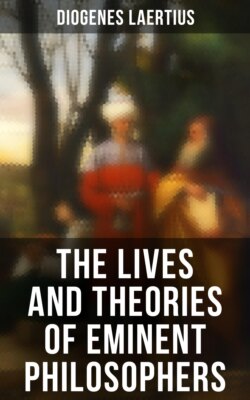Читать книгу The Lives and Theories of Eminent Philosophers - Diogenes Laertius - Страница 3
На сайте Литреса книга снята с продажи.
PREFACE.
ОглавлениеTable of Contents
Diogenes, the author of the following work, was a native (as is generally believed) of Laërte, in Cilicia, from which circumstance he derived the cognomen of Laërtius. Little is known of him personally, nor is even the age in which he lived very clearly ascertained. But as Plutarch, Sextus Empiricus, and Saturninus are among the writers whom he quotes, he is generally believed to have lived near the end of the second century of our era: although some place him in the time of Alexander Severus, and others as late as Constantine. His work consists of ten books, variously called: The Lives of Philosophers, A History of Philosophy, and The Lives of Sophists. From internal evidence (iii. 47, 29), we learn that he wrote it for a noble lady (according to some, Arria; according to others, Julia, the Empress of Severus), who occupied herself with the study of philosophy, and especially of Plato.
Diogenes Laërtius divides the philosophy of the Greeks into the Ionic, beginning with Anaximander, and ending with Theophrastus (in which class, he includes the Socratic philosophy and all its various ramifications); and the Italian, beginning with Pythagoras, and ending with Epicurus, in which he includes the Eleatics, as also Heraclitus and the Sceptics. From the minute consideration which he devotes to Epicurus and his system, it has been supposed that he himself belonged to that school.
His work is the chief source of information we possess concerning the history of Greek philosophy, and is the foundation of nearly all the modern treatises on that subject; some of the most important of which are little more than translations or amplifications of it. It is valuable, as containing a copious collection of anecdotes illustrative of the life and manners of the Greeks; but he has not always been very careful in his selection, and in some parts there is a confusion in his statements that makes them scarcely intelligible. These faults have led some critics to consider the work as it now exists merely a mutilated abridgment of the original. Breslæus, who in the thirteenth century, wrote a Treatise on the Lives and Manners of the Philosophers, quotes many anecdotes and sayings, which seem to be derived from Diogenes, but which are not to be found in our present text; whence Schneider concludes that he had a very different and far more complete copy than has come down to us.
The text used in the following translation is chiefly that of Huebner, as published at Leipsic, A.D. 1828.
